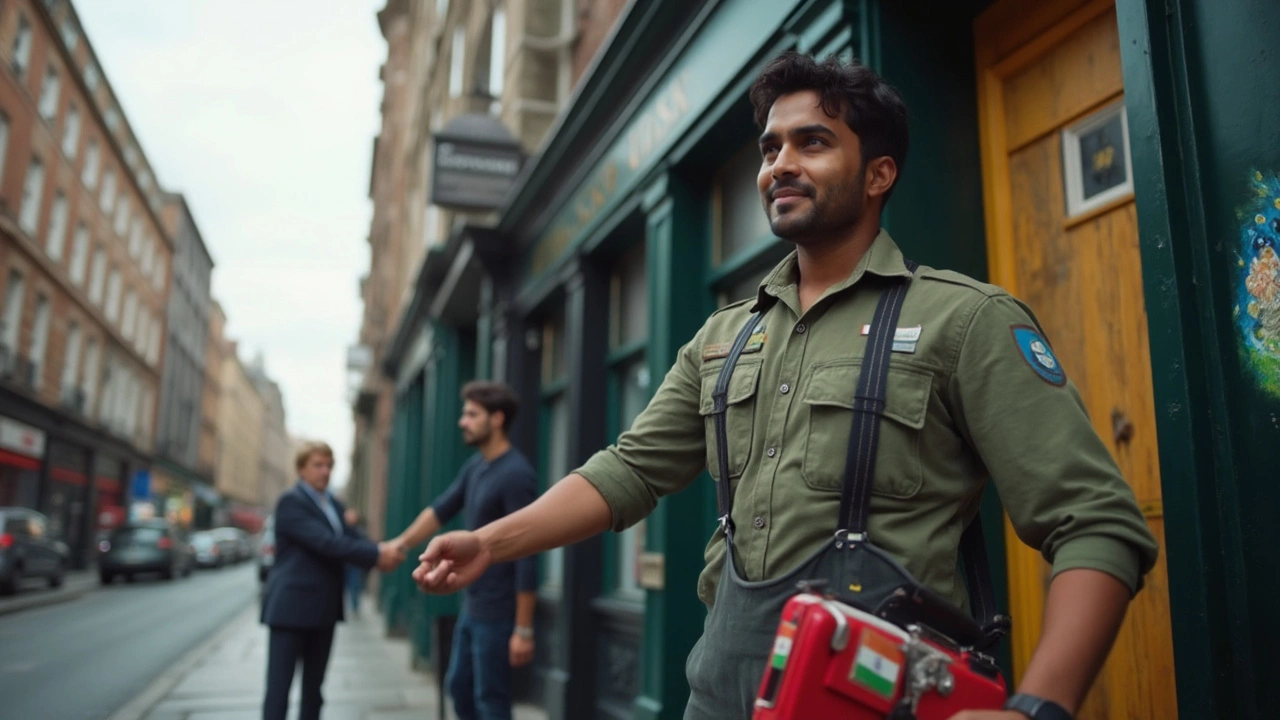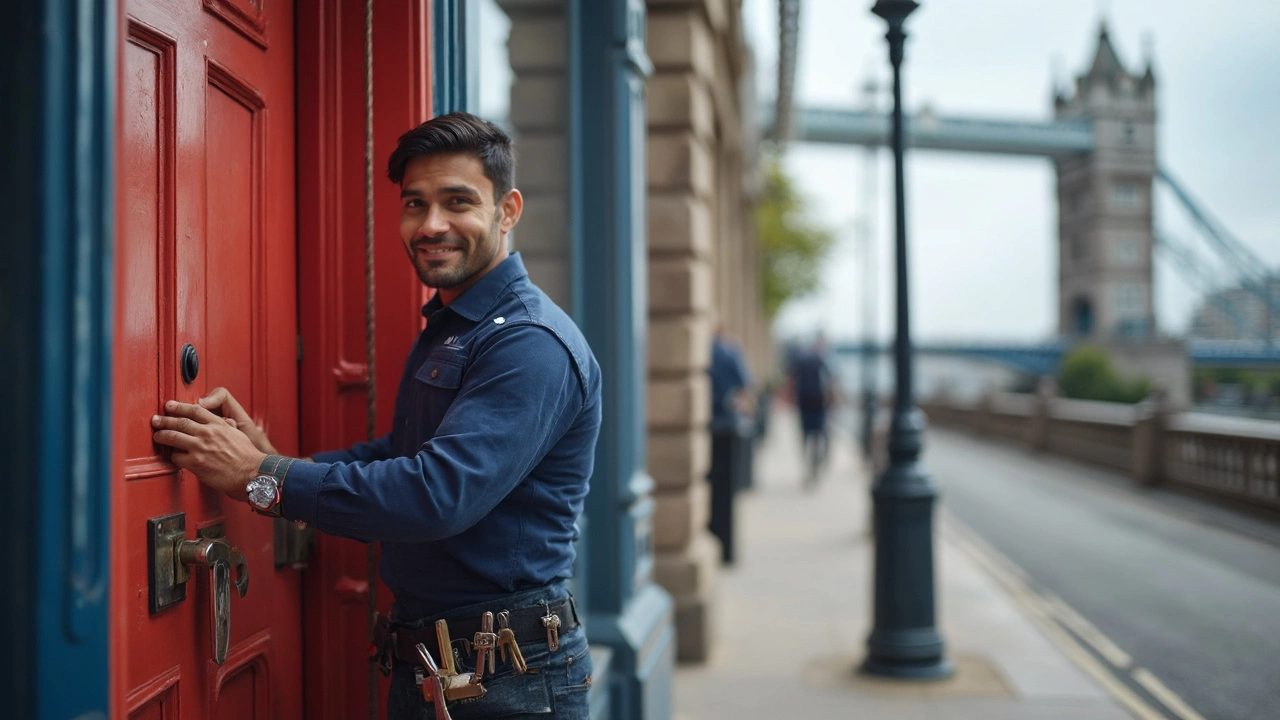Locksmithing isn't just about picking locks—especially in Ireland, where rules and skill standards are strict. If you're already curious about tools, security tech, or even just enjoy solving puzzles, you could be a strong fit for this profession.
Stories about Irish locksmiths flying out at 2am to rescue someone locked out of their flat? That's real. But behind the scenes, there’s a solid process for learning the trade and getting properly certified. You can’t just walk in and start changing locks—you’ll need to train and prove you know your stuff, especially if you want to work legally and get insured.
Thinking about moving from India to Ireland or just want to know how your locksmith skills could travel internationally? The Irish system is quite organized. There are set courses, on-the-job training, and a clear path to getting registered. Plus, Irish homes and businesses use a mix of old and new lock technologies, so you get to work with everything from classic keys to smart lock systems.
- Ireland’s Locksmith Scene: What You Should Know
- Training and Certification: Your First Steps
- Legal Stuff: Registration and Requirements
- Building Skills and Real-World Experience
- Tips for Success and Growing Your Career
Ireland’s Locksmith Scene: What You Should Know
The locksmith scene in Ireland is way more modern and regulated than most people imagine. There’s no “winging it” here. First thing to know: locksmiths in Ireland usually work on all things lock-related—homes, cars, business premises, safes, and even electronic access controls.
You’re not just dealing with old-school locks. Many Irish homes use high-security systems and digital ones are getting more popular, especially in bigger cities like Dublin and Cork. From digital keypad locks to cylinder systems imported from Germany, you’ll face a wide mix.
Insurance and registration matter a lot. If you call yourself a locksmith in Ireland and start working for customers, people expect you to be Garda-vetted (background checked by the Irish police). Customers won’t usually trust anyone who isn’t registered. And if you’re hoping to work for bigger companies or government contracts, registration with the Private Security Authority (PSA) is usually a must.
Here’s a quick look at what the Irish locksmith market looks like:
| Aspect | Details |
|---|---|
| PSA Licensing | Mandatory for legal locksmith work |
| Average Response Time | 30-60 minutes for emergencies |
| Common Services | Residential, automotive, commercial, safe services, digital locks |
| Common Cities | Dublin, Cork, Galway, Limerick, Waterford |
The good news: Ireland’s locksmith industry is growing. With more electronic locks and security upgrades being installed, there’s always demand for skilled professionals—especially those who keep up with new technologies. Lockout emergencies are common, but maintenance, repairs and digital security upgrades are where a lot of locksmiths make steady money.
Keep in mind: the professional community is tight-knit. Most locksmiths know each other and reputation means everything. If you do good work and follow the rules, you’ll find it easier to fit in and get referrals.
The bottom line? Ireland’s locksmith market wants properly trained, reliable people—no shortcuts. If you’re planning to jump in, get ready to train right, follow regulations closely, and build trust with each job.
Training and Certification: Your First Steps
Kicking off your locksmith career in Ireland means investing time in solid training. Unlike some trades, there’s no official college degree required, but you can’t just rely on YouTube either. Instead, you’ll need to get hands-on, practical education.
Most people start with a recognized locksmith training course. The main players in Ireland are the Associated Locksmiths of Ireland (ALOI) and Locksmiths Guild of Ireland. These groups offer courses ranging from beginner basics—like changing locks and cutting keys—to more advanced stuff, such as fitting electronic security systems. A lot of courses last a few days up to a couple of weeks, usually taught face-to-face, sometimes with an online theory part.
- Beginner Courses: These cover lock types, key cutting, tools, and basic security guidance. No prior experience is needed.
- Advanced Courses: Here you get into alarms, safes, electronic locks, and more detailed problem-solving.
- Practical Workshops: You’ll get real locks, doors, and the tools pros use, so you can learn by actually doing the job.
The most respected training ends with certification—especially if it follows ALOI or City & Guilds standards. Some employers and insurance companies insist on this before they’ll work with you. Here’s a quick look at what these certificates typically mean:
| Certification | What It Proves |
|---|---|
| ALOI Certificate | You’ve passed accredited Irish locksmith training and can join the professional network. |
| City & Guilds Locksmithing | Internationally recognized, shows solid skills and theory knowledge. Handy if you plan to move or contract abroad. |
If you’re starting in India and hoping to make a shift to the Irish market, look for City & Guilds-approved training. It travels well, and Irish employers trust it. Either way, don’t skip these steps—training and certification open doors, literally and career-wise.

Legal Stuff: Registration and Requirements
So, here’s what’s really important: before you even start working as a locksmith in Ireland, you need to be registered and meet all legal requirements. It’s not something you can skip—Irish law takes security jobs seriously, and locksmiths are on that list.
The biggest must-have is a Private Security Authority (PSA) license. The PSA keeps track of everyone working in the security field. Without this license, you’re not legally allowed to work as a locksmith. You can’t even advertise your services without one. Even if you have locksmith training from India, you’ll still need to go through these steps to work in Ireland.
Here’s how the process works:
- Finish Your Training: You’ll need recognized locksmith training and probably some hands-on experience—courses from FETAC or equivalent are popular here.
- Background Checks: The PSA does Garda (Irish police) vetting to check you don’t have any dodgy records. Clean background? You’re good to go.
- Application: Apply directly with the Private Security Authority. You’ll need ID, proof of address, training certificates, and sometimes references.
- Pay the Fee: There’s an application fee, usually around €1,000 for a locksmith license (check the PSA site for current prices).
- Wait for Approval: Processing can take a few weeks, so plan ahead.
If you want to see how this matches up, here’s a quick look at what most applicants need:
| Requirement | Details |
|---|---|
| Training | FETAC/QQI Level 5 or equivalent (some overseas courses may be accepted if verified) |
| Background Check | Garda vetting—no major criminal record |
| Application Fee | ~€1,000 (renewable every 5 years) |
| Documents Needed | ID, proof of address, certificates, references |
One thing to remember: insurance is not optional. Clients, landlords, and businesses almost always ask for proof you’re insured. This protects you if anything gets damaged or if there’s an accident on the job.
Also, if you’re coming from India, check if your training matches the Irish system. The PSA sometimes accepts international qualifications, but they might ask for extra proof or additional courses. Double-check before you move or invest in a new course.
Building Skills and Real-World Experience
Getting good as a locksmith in Ireland means more than just finishing a course. You need hands-on practice—fixing locks, installing security systems, and dealing with actual lockouts. Irish employers and customers expect you to really know what you’re doing, so experience matters a ton.
Most trainees start by shadowing an established locksmith. This usually involves learning simple jobs first, like rekeying locks and making basic keys. As you get more confident, you’ll move on to tougher stuff: working with uPVC door mechanisms, car transponder keys, and smart locks. In big cities like Dublin and Cork, you’ll see plenty of high-tech security systems. In rural areas, old-school mortice locks and worn-out padlocks are common.
If you’re coming from outside Ireland, having experience with British or EU-style locks is a bonus—these are everywhere. Indian trainees, take note: cylinder locks found in Ireland work differently from the pin tumbler locks you see at home. Practice until you can handle both types without breaking a sweat.
Here’s how most people improve their skills and get real-world experience:
- Apprenticeships: The classic way. You work under a certified locksmith for 1-3 years. The best learning happens here, on the job, fixing real problems.
- Workshops and Training Centres: Attend hands-on workshops—they’re usually short, but you learn specific skills like safe opening or smart lock installation.
- Online Simulators: Some Irish training centres offer virtual lock-picking tools to mimic real scenarios. These can help before you work on actual customers’ locks.
- Manufacturer Demos: Brands like Yale, CISA, and Mul-T-Lock run sessions for new products. Stay updated, because someone will call you about the latest gadgets sooner or later.
Here’s a look at the kinds of lock systems you’ll run into as a practicing locksmith in Ireland:
| Lock Type | Common Use | Skill Level Needed |
|---|---|---|
| Euro Cylinder | Front/Back Doors | Medium |
| Mortice Lock | Older Homes | High |
| Multipoint Locking System | uPVC Doors | High |
| Digital/Smart Locks | Offices/Homes | Advanced |
| Padlocks | Gates/Sheds | Basic |
If you want to gain trust, join the Associated Locksmiths of Ireland (ALOI). These folks run exams and networking events that keep you sharp and legit. And trust me, real-world experience weighs more than any certificate—you’ll make fewer mistakes, work faster, and build a name people remember.

Tips for Success and Growing Your Career
If you want to stand out as a locksmith in Ireland, you’ve got to do more than just fix broken locks. Here’s what actually makes a difference in this industry.
- Keep up with technology. Familiarize yourself with digital locks, electronic access control, and smart home security systems. Lots of homes and offices in Ireland are switching to these. If you only know old-school locks, you’ll get left behind.
- Build a good reputation. Word-of-mouth is huge in the locksmith game. Most Irish customers check online reviews or ask friends before calling someone. Make sure your clients are happy and ask them to leave honest feedback online.
- Get insured. You need public liability insurance to operate professionally. Irish law has gotten tighter about this. It protects you if something goes wrong on a job.
- Network with local security companies. Many locksmiths get steady work through referral deals with alarm installers or builders. It’s easier than hunting for new customers every week.
- Show your credentials. Always display your locksmith certification and registration. Irish clients expect to see proof. They’re quick to turn away anyone who can’t show official paperwork.
Keen to know what people in the field think? Here’s one for you:
“Skills and honesty go hand-in-hand in the locksmith trade. Clients trust you with their security, so always be upfront and never cut corners—your reputation will do most of your marketing.”
— Pat Quinn, Registered Locksmith (Dublin Locksmith Association)
Packing your toolkit with knowledge is just as important as having the right lock picks. Curious about how the business is growing? Check out this recent market snapshot:
| Year | Estimated Lock Installations in Ireland |
|---|---|
| 2021 | 48,000 |
| 2022 | 51,000 |
| 2023 | 54,500 |
The demand for skilled locksmith pros continues to rise. Irish households and businesses aren’t just looking for anyone with a toolkit—they want trained, trustworthy folks who know both traditional and modern systems. Keep up with tech, invest in your learning, and you can build a steady career here.


